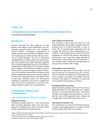
New treatments for skin conditions show promise, especially Coacillium® for hair growth in young people with alopecia areata.
 February 2024 in “Hormones”
February 2024 in “Hormones” Future hormone therapy trials should match the diverse needs and priorities of the gender-diverse community.
 January 2024 in “Deleted Journal”
January 2024 in “Deleted Journal” Essential oils like lavender, chamomile, and bergamot help manage stress and improve well-being.
 December 2023 in “Frontiers in microbiology”
December 2023 in “Frontiers in microbiology” Mannan oligosaccharides improve raccoon dogs' fur quality and overall health.

Kalya Research is an AI tool that effectively finds and analyzes alternative medicine literature, saving researchers time.
 November 2023 in “Frontiers in veterinary science”
November 2023 in “Frontiers in veterinary science” The study provides insights into hair growth mechanisms in yaks.
 November 2023 in “European medical journal. Dermatology”
November 2023 in “European medical journal. Dermatology” PRP can reduce pain and improve function, but more standardized research is needed.
 November 2023 in “Linköping University medical dissertations”
November 2023 in “Linköping University medical dissertations” Keratinocytes and adipose-derived stem cells can effectively heal difficult skin wounds.
 June 2023 in “International journal of science and research”
June 2023 in “International journal of science and research” PRP injections help hair regrowth safely but may need more research.

The study aims to create a model to improve personalized and preventive health care.
 January 2023 in “Revista Paulista de Pediatria”
January 2023 in “Revista Paulista de Pediatria” A Brazilian male with IFAP syndrome has a unique genetic variant causing his condition.

Water and fatty acids affect hair's surface differently based on hair damage, and models can help understand hair-cosmetic interactions.
 August 2022 in “Frontiers in genetics”
August 2022 in “Frontiers in genetics” A new genetic change in the DSC3 gene is linked to a rare condition causing hair loss and skin blisters in a child.
 December 2021 in “Molecular genetics and genomics”
December 2021 in “Molecular genetics and genomics” Cats with abnormal hair had DSG4 gene changes causing hair problems.
 June 2021 in “Journal of emerging technologies and innovative research”
June 2021 in “Journal of emerging technologies and innovative research” Onion and Aloe vera can help protect hair from damage caused by hair dyes.

The document is a detailed guide on skin conditions and treatments for dermatologists.
 August 2019 in “Stem cells”
August 2019 in “Stem cells” New treatments for hair loss, fertility, and wound healing are being explored.
 April 2019 in “Advances in Cosmetic Surgery”
April 2019 in “Advances in Cosmetic Surgery” The document concludes that ongoing medical therapy is crucial for preventing hair loss, and surgical options can restore hair, with future treatments for hair loss being promising.
 January 2019 in “Springer eBooks”
January 2019 in “Springer eBooks” Platelet-rich plasma therapy may have benefits and is generally safe, but more research is needed to confirm its effectiveness and safety.
 November 2018 in “Springer eBooks”
November 2018 in “Springer eBooks” Finasteride and minoxidil are effective, low-risk treatments for male hair loss, and patient education on these therapies is important.

Melanocyte transplantation can safely restore skin color, especially in stable vitiligo, but must be chosen carefully based on the disease phase.
 January 2018 in “Annals of Dermatology”
January 2018 in “Annals of Dermatology” Newspaper articles on alopecia are often inaccurate and sometimes mix up different types of hair loss.

Skin stem cells are crucial for maintaining and repairing skin, with potential for treating skin disorders and improving wound healing.
 April 2016 in “Plastic and reconstructive surgery. Global open”
April 2016 in “Plastic and reconstructive surgery. Global open” The supplement highlighted advancements and challenges in plastic and reconstructive surgery, including the impact of smoking, chemotherapy, and new treatments like Tafluprost for hair loss.
 January 2016 in “Georg Thieme Verlag eBooks”
January 2016 in “Georg Thieme Verlag eBooks” Facelift surgery has evolved to focus on natural results and safety, with patient selection and postoperative care being key to success.
 May 2014 in “Annals of Plastic Surgery”
May 2014 in “Annals of Plastic Surgery” The book is highly praised as an essential resource for plastic surgeons, despite minor gaps.
 September 2013 in “Experimental Dermatology”
September 2013 in “Experimental Dermatology” The document concluded that stem cells are crucial for skin repair, regeneration, and may help in developing advanced skin substitutes.

Wound healing is complex and requires more research to enhance treatment methods.
 June 2011 in “Oncology times”
June 2011 in “Oncology times” New treatments are making advanced prostate cancer management more complex but also more hopeful.
 May 2011 in “Value in Health”
May 2011 in “Value in Health” CP-690,550 significantly reduced itching in patients with moderate-to-severe plaque psoriasis.






























